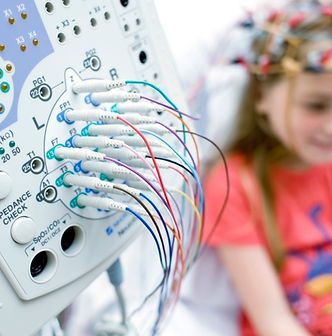
🧠 Can TMS Make Anxiety Worse? Understanding What Really Happens During Brain Stimulation Therapy
- Reign-Bow

- Nov 12, 2025
- 3 min read
If you’ve been exploring Transcranial Magnetic Stimulation (TMS) as a treatment for depression or anxiety, you may have seen online discussions asking, “Can TMS make anxiety worse?” At Reign-Bow Treatment Center, we understand how concerning that question can feel—especially if you’re already dealing with heightened anxiety or panic symptoms. This post explains what research shows, what patients can expect, and why temporary discomfort doesn’t mean the therapy isn’t working.
What Is TMS Therapy?
TMS (Transcranial Magnetic Stimulation) is a non-invasive, FDA-cleared therapy that uses gentle magnetic pulses to target specific areas of the brain associated with mood regulation—especially the prefrontal cortex. By stimulating underactive regions, TMS helps rebalance neural activity linked to depression, anxiety, and other mood disorders.
At Reign-Bow Treatment Center, we go beyond standard protocols by using guided qEEG brain mapping, allowing us to personalize treatment to each individual’s unique brainwave pattern.
Can TMS Cause Anxiety to Feel Worse at First?
In some cases, patients may notice a temporary increase in anxiety at the beginning of TMS treatment. This does not mean the therapy is harmful or ineffective—it’s typically a short-term adjustment period as your brain begins to respond to stimulation.
Here’s why this can happen:
🧩 Neurochemical changes: As your brain’s neurotransmitters (like serotonin and dopamine) start to rebalance, temporary mood fluctuations can occur.
⚡ Heightened awareness: Some people become more attuned to their physical sensations or emotions early in treatment, which may feel like “more anxiety.”
💤 Sleep and fatigue shifts: Changes in sleep or energy levels can influence anxiety temporarily.
Most patients report these symptoms improve within the first 1–2 weeks, followed by a gradual sense of calm, improved focus, and better emotional regulation.
Research Shows TMS Reduces Anxiety Long-Term
Clinical studies show that TMS does not worsen anxiety long-term—in fact, it often leads to significant improvement.
A study published in the Journal of Affective Disorders found that over 60% of patients experienced anxiety reduction alongside depression relief.
TMS has also been shown to reduce generalized anxiety disorder (GAD) symptoms and panic disorder frequency by targeting the brain’s fear response network.
At Reign-Bow Treatment Center, we’ve seen consistent results where patients describe feeling “lighter,” “less reactive,” and “more in control” after a full treatment course.
How Personalized Brain Mapping Helps Prevent Over-Stimulation
Every brain is unique—which is why one-size-fits-all TMS protocols can occasionally feel uncomfortable.
Through qEEG-guided protocols , we identify each patient’s exact brainwave imbalances and customize stimulation frequency to match their optimal resonance pattern. This approach reduces the risk of overstimulation and helps create a calmer, smoother response.
What to Do if You Feel More Anxious During TMS
If your anxiety feels stronger during the first few sessions:
Communicate with your clinician. Adjusting the session intensity or timing can help.
Track your symptoms. Journaling or using a mood-tracking app helps monitor progress objectively.
Support your body. Sleep, hydration, and nutrition play a major role in calming the nervous system.
Stay consistent. The therapeutic benefits of TMS build cumulatively; stopping early may prevent you from reaching lasting relief.
Real Results: A Calmer, Clearer Mind
Many of our patients who once feared that TMS might worsen their anxiety now describe the opposite outcome—better focus, deeper sleep, and a calmer mind. When paired with guided support and data-driven mapping, the therapy can become a life-changing step toward balance.
Final Thoughts
So, can TMS make anxiety worse?
In most cases, no. While some people may experience temporary increases in anxiety early in treatment, the overwhelming evidence shows TMS decreases anxiety over time by helping your brain reset and regulate itself.
Book a Consultation 630-448-2721
If you’re struggling with anxiety, panic, or depression and want to explore a non-medication-based treatment option, our team at Reign-Bow Treatment Center is here to help.






Comments